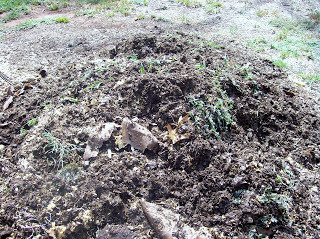Frugal Friday: Composting Made Easy
One of the best ways to save money is to grow your own vegetables. Gardening really isn't all that difficult, as long as you keep your plants fed and watered. There's nothing better than a compost pile to feed your plants, and it costs nothing!
Some of you who are already gardening may have considered a compost pile for a while now, but
somewhere along the way you've been led to believe that composting is
time-consuming, expensive and takes up too much space. Nothing could be
further from the truth.
Composting doesn't have to be hard, nor does it require any special
equipment. Truth is, composting has been going on, well, since God made
dirt.
Composting is simply the process in which organic material decays. Composted soil is
rich with nutrients plants love and need. Since plants deplete the
nutrients in soil, composting is a logical means in which to replenish
the earth with nutrients for the next growing season.
Here is a list of all you need to create rich compost for use in your garden:
brown matter (leaves, corrugated cardboard, straw, hay, or any plant matter that has died)
green matter (fresh grass clippings, weeds pulled from the garden or
beds, fruits and vegetables that have recently gone bad, etc.)
a tool to turn the pile with
a water supply to keep the pile wet
(optional) tools to grind the organic matter into finer pieces
STEPS TO CREATING COMPOST:
1. Layer your brown matter and green matter.
2. If you want to speed up the process, grind or chop the matter into
fine particles. This can be done with the aid of a weed-eater, mulching
lawn mower, chipper/shredder, and even a food processor.
3. Soak the layers with water and keep the pile moist.
4. Turn the pile with a shovel or fork on a regular basis to allow particles on top to be moved lower.
5. Optional: You can also add a little dirt to the mixture.
WHAT TO EXPECT:
1. As the organic material decomposes it will put off heat.
2. If you keep vegetable and fruit materials covered up, there will not
be a rotten food odor or fruit flies. Instead what you will smell will
be the pleasant musty smell of rich soil.
3. If you maintain and add to your compost pile throughout the gardening
season, by winter you will have a wonderful supply of rich organic
material to add to your garden for the next growing season.
4. The decomposing process will shrink the size of your compost pile, so add to it regularly.
Here's a photo of my compost pile. You'll notice bits of green and lots
of brown (and even pieces of decomposing cardboard). Mine has corn cobs, cantaloupe rinds, leaves, fresh-pulled weeds, grass
clippings, and even the used pine shavings from my chicken coops, along with free fertilizer from the chickens!

I said it before, but it bears repeating: composting needn't be difficult. After all, it's God's original recycling program. ;)
Happy Composting,










Some of you who are already gardening may have considered a compost pile for a while now, but
somewhere along the way you've been led to believe that composting is
time-consuming, expensive and takes up too much space. Nothing could be
further from the truth.
Composting doesn't have to be hard, nor does it require any special
equipment. Truth is, composting has been going on, well, since God made
dirt.
Composting is simply the process in which organic material decays. Composted soil is
rich with nutrients plants love and need. Since plants deplete the
nutrients in soil, composting is a logical means in which to replenish
the earth with nutrients for the next growing season.
Here is a list of all you need to create rich compost for use in your garden:
brown matter (leaves, corrugated cardboard, straw, hay, or any plant matter that has died)
green matter (fresh grass clippings, weeds pulled from the garden or
beds, fruits and vegetables that have recently gone bad, etc.)
a tool to turn the pile with
a water supply to keep the pile wet
(optional) tools to grind the organic matter into finer pieces
STEPS TO CREATING COMPOST:
1. Layer your brown matter and green matter.
2. If you want to speed up the process, grind or chop the matter into
fine particles. This can be done with the aid of a weed-eater, mulching
lawn mower, chipper/shredder, and even a food processor.
3. Soak the layers with water and keep the pile moist.
4. Turn the pile with a shovel or fork on a regular basis to allow particles on top to be moved lower.
5. Optional: You can also add a little dirt to the mixture.
WHAT TO EXPECT:
1. As the organic material decomposes it will put off heat.
2. If you keep vegetable and fruit materials covered up, there will not
be a rotten food odor or fruit flies. Instead what you will smell will
be the pleasant musty smell of rich soil.
3. If you maintain and add to your compost pile throughout the gardening
season, by winter you will have a wonderful supply of rich organic
material to add to your garden for the next growing season.
4. The decomposing process will shrink the size of your compost pile, so add to it regularly.
Here's a photo of my compost pile. You'll notice bits of green and lots
of brown (and even pieces of decomposing cardboard). Mine has corn cobs, cantaloupe rinds, leaves, fresh-pulled weeds, grass
clippings, and even the used pine shavings from my chicken coops, along with free fertilizer from the chickens!

I said it before, but it bears repeating: composting needn't be difficult. After all, it's God's original recycling program. ;)
Happy Composting,










Published on January 24, 2013 22:00
No comments have been added yet.
CatBryant.com ~ Journey Blog
FREE digital copy of A PATH LESS TRAVELED (2nd stand-alone book in the Miller's Creek novels and an Amazon Kindle Best-Seller) when you subscribe to Cathy's FROM MY FRONT PORCH newsletter. On my blog
FREE digital copy of A PATH LESS TRAVELED (2nd stand-alone book in the Miller's Creek novels and an Amazon Kindle Best-Seller) when you subscribe to Cathy's FROM MY FRONT PORCH newsletter. On my blog I write about life in general, though most of my posts tend to be book-related or devotional in nature. I'd love to have you drop by for a visit, where you can sign up for blog posts (via e-mail or RSS) Hope to see you at http://www.CatBryant.com!
...more
- Cathy Bryant's profile
- 390 followers



